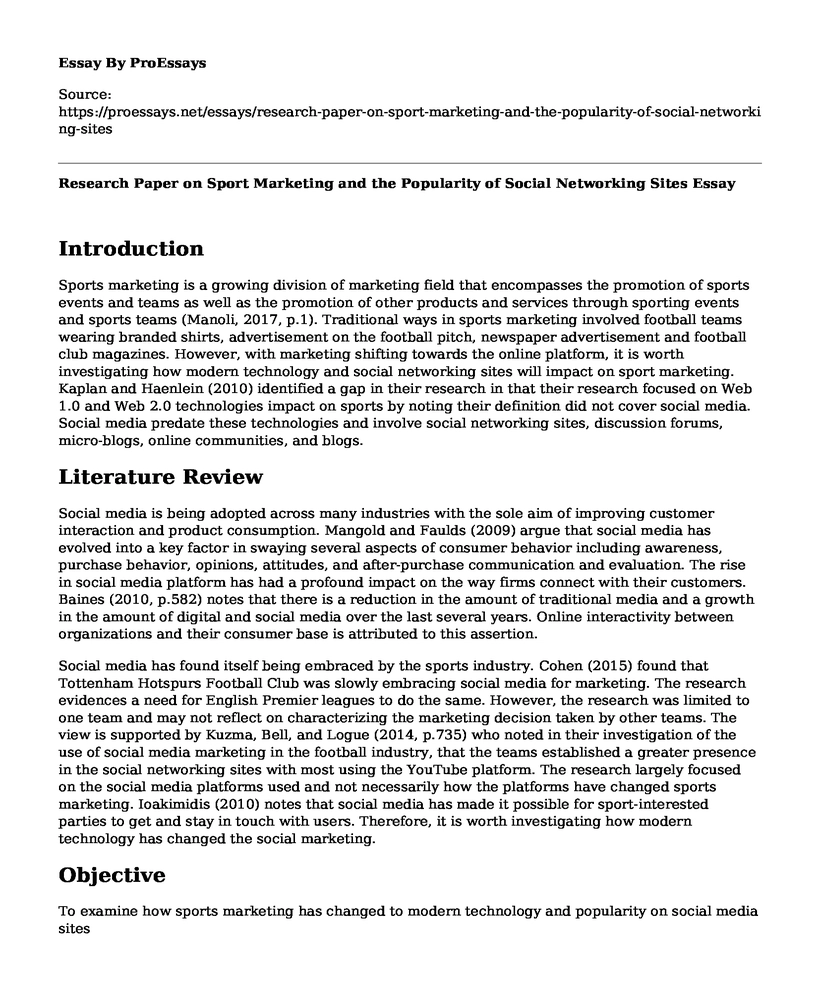Introduction
Sports marketing is a growing division of marketing field that encompasses the promotion of sports events and teams as well as the promotion of other products and services through sporting events and sports teams (Manoli, 2017, p.1). Traditional ways in sports marketing involved football teams wearing branded shirts, advertisement on the football pitch, newspaper advertisement and football club magazines. However, with marketing shifting towards the online platform, it is worth investigating how modern technology and social networking sites will impact on sport marketing. Kaplan and Haenlein (2010) identified a gap in their research in that their research focused on Web 1.0 and Web 2.0 technologies impact on sports by noting their definition did not cover social media. Social media predate these technologies and involve social networking sites, discussion forums, micro-blogs, online communities, and blogs.
Literature Review
Social media is being adopted across many industries with the sole aim of improving customer interaction and product consumption. Mangold and Faulds (2009) argue that social media has evolved into a key factor in swaying several aspects of consumer behavior including awareness, purchase behavior, opinions, attitudes, and after-purchase communication and evaluation. The rise in social media platform has had a profound impact on the way firms connect with their customers. Baines (2010, p.582) notes that there is a reduction in the amount of traditional media and a growth in the amount of digital and social media over the last several years. Online interactivity between organizations and their consumer base is attributed to this assertion.
Social media has found itself being embraced by the sports industry. Cohen (2015) found that Tottenham Hotspurs Football Club was slowly embracing social media for marketing. The research evidences a need for English Premier leagues to do the same. However, the research was limited to one team and may not reflect on characterizing the marketing decision taken by other teams. The view is supported by Kuzma, Bell, and Logue (2014, p.735) who noted in their investigation of the use of social media marketing in the football industry, that the teams established a greater presence in the social networking sites with most using the YouTube platform. The research largely focused on the social media platforms used and not necessarily how the platforms have changed sports marketing. Ioakimidis (2010) notes that social media has made it possible for sport-interested parties to get and stay in touch with users. Therefore, it is worth investigating how modern technology has changed the social marketing.
Objective
To examine how sports marketing has changed to modern technology and popularity on social media sites
Research Questions
- Are English Premier League teams using Social Media?
- If so, what functions do the various social media sites serve and to what extent?
Methodology
The study will analyze 10 teams from the English Premier League. Each football team would be analyzed for their use of social media communication based on replies from their fans. For each team, participants will register online, and a maximum of 10 participants per team will be allowed, and they will answer an online questionnaire. Sampling is purposive and prescribed in social media studies, and thus the effective instrument of data collection is the interview (Goulding, 2005, p.302).
Interview Questions
- Which team are you a fan?
- Which major online platforms do you engage your team members?
- How often do you interact with each other?
- Which brand is sponsoring your team?
- Who is the favorite player in the team?
- On which online platform do you follow him?
- Which products has he endorsed?
- Have you ever purchased any of the products endorsed?
- From which other platform do you access the social media platforms?
- How different do you think social media has changed from traditional ways of interacting with your team?
References
Baines, D. (2010). Hyperlocal: glocalised rural news. International Journal of Sociology and Social Policy, 30(9/10), pp.581-592.
Cohen, I. (2015). Social Media and Marketing: The Evolution of Tottenham Hotspur Football Club. Handbook of Research on Integrating Social Media into Strategic MarketingHandbook of Research on Integrating Social Media into Strategic Marketing.
Goulding, C. (2005). Grounded theory, ethnography, and phenomenology. European Journal of Marketing, 39(3/4), pp.294-308.
Ioakimidis, M. (2010). Online marketing of professional sports clubs: engaging fans on a new playing field. International Journal of Sports Marketing and Sponsorship, 11(4), pp.2-13.
Kaplan, A. and Haenlein, M. (2010). Users of the world, unite! The challenges and opportunities of Social Media. Business Horizons, 53(1), pp.59-68.
Kuzma, J., Bell, V. and Logue, C. (2014). A Study of the Use of Social Media Marketing in the Football Industry. Journal of Emerging Trends in Computing and Information Sciences, 5(10).
Mangold, W. and Faulds, D. (2009). Social media: The new hybrid element of the promotion mix. Business Horizons, 52(4), pp.357-365.
Manoli, A. (2017). Sport marketing's past, present, and future; an introduction to the special issue on contemporary issues in sports marketing. Journal of Strategic Marketing, 26(1), pp.1-5.
Cite this page
Research Paper on Sport Marketing and the Popularity of Social Networking Sites. (2022, Dec 14). Retrieved from https://proessays.net/essays/research-paper-on-sport-marketing-and-the-popularity-of-social-networking-sites
If you are the original author of this essay and no longer wish to have it published on the ProEssays website, please click below to request its removal:
- Supply Chain Manager's Primary Duties Paper Example
- Essay Sample on Effect of Dating App on Modern Dating
- Essay on Digital Marketing: Strategies of Amazon Company (AMZN) in the 21st Century
- Paper Example on Mentoring African-American Male Youth in South Carolina: Examining Perceptions
- Gentrification: Transforming Neighborhoods Into Vibrant Communities - Essay Sample
- Attractive Relationship Alt. Impacts Early Cognition & Self-Protection - Essay Sample
- Paper Example on Marriage & Family Therapists Help Elderly & Families Manage Aging Transitions







